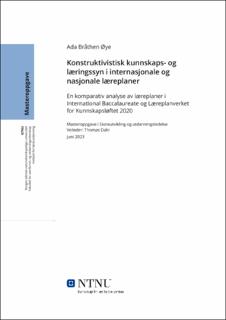Konstruktivistisk kunnskaps- og læringssyn i internasjonale og nasjonale læreplaner. En komparativ analyse av læreplaner i International Baccalaureate og Læreplanverket for Kunnskapsløftet 2020
Master thesis
Permanent lenke
https://hdl.handle.net/11250/3092815Utgivelsesdato
2023Metadata
Vis full innførselSamlinger
Sammendrag
Denne studien er knyttet til prosjektet «Kunnskaps- og læringssyn i skolen – paradigmer og praksis», som er ledet av Thomas Dahl. Studien tar utgangspunkt i dagens diskusjon om kunnskap og læring, og OECDS rammeverk om fremtidens skole, som oppfordrer til en utdanning som gir elevene «agency» og «a sense of purpose». Problemstillingen som undersøkes er:
Hvilke lærings- og kunnskapssyn preger International Baccalaureates læreplanverk og Læreplanverket for Kunnskapsløftet 2020?
For å undersøke problemstillingen benyttes kvalitativ forskningsmetode, og en komparativ dokumentanalyse av IBs læreplaner og LK20. videre forskningsspørsmål som blir belyst er hvilke implikasjoner dette har for ulike nivåer i skolen, fra læreplan, til ledelse og lærere, og hvilke føringer læreplanene gir for utviklingsarbeidet.Teorigrunnlaget for studien er konstruktivistisk læringsteori med utgangspunkt i Deweys erfaringslæring, og videre Piagets teori om kognitiv konstruktivisme og Bruners teori om konstruktivistiske læringsmodeller. Teorien til Gardner om Multiple intelligences blir også gjennomgått. Av teori om organisasjon og ledelse, tar studien utgangspunkt i Klev og Levins teori om samskapt læring, Irgens teori om lærende organisasjoner og teori om partssamarbeidet som organisasjonsutvikling.
Læreplandokumenter fra IB og LK20 analyseres med en tematisk inngang gjennom begrepene «kunnskap» og «læring». Analysen av dokumentene organiseres tematisk, og går fra det generelle til det detaljerte med nærlesing og analyse av enkeltstående tekstenheter, først i læreplaner fra IB, deretter LK20. Metoden her er hovedsakelig induktiv og hermeneutisk, med en fortolkning av funnene på flere nivåer.
Funnene viser at læreplaner fra både IB og LK20 er preget av konstruktivistisk læringsteori, da eleven blir fremstilt som en aktør i engel kunnskapsutvikling og læringsprosess, som en skapende og bevisst prosess. I IBs læreplaner, som er forankret i Deweys teorier om erfaringslæring, kommer konstruktivismen enda sterkere til uttrykk enn i LK20. Begge læreplaner gir også føringer for profesjonelle lærende fellesskap (PLF) på ulike nivåer i skolen, både for elever, lærere og ledere. Begge læreplaner ser også kunnskap som noe mer enn akademisk kunnskap, og vektlegger en holistisk utvikling av eleven i en danningstradisjon, og dette kan sees i sammenheng med Gardners om multiple intelligences. Denne læringsteorien kan også spores til metode og læringsstrategier i læreplanene.
Studien konkluderer med at til tross for åpenbare ulikheter både i kontekst og innhold, viser analysen at konstruktivistisklæringsteori preger begge læreplanverk, og at de også har spor av teorien om multiple intelligences. Når det gjelder ledelse og organisasjonsutvikling, viser studien også at begge planer gir føringer for PLF som kan forankres i teorien om samskapt læring og lærende organisasjoner.En videre konklusjon er også at studien kan oppfordre til videre forskning på hvordan Deweys og Gardners læringsteorier preger læreplaner i andre land. This study is linked to the project "Knowledge and Learning Perspectives in Schools – Paradigms and Practice", led by Thomas Dahl. The study is based on the ongoing discussion about knowledge and learning linked to the OECD framework Future of Education and Skills 2030, which encourages an education in which students develop "agency" and "a sense of purpose". The research question is:
What views on learning and knowledge characterise the International Baccalaureate’s curriculum and the curriculum for the Knowledge Promotion Reform 2020?
To investigate the research question, qualitative research methods and a comparative document analysis of IB's curricula and LK20 are used. Further research questions that are highlighted are what implications this has for different levels in schools, from the curriculum, to the school leadership and the teachers, and what guidelines the curricula provide for professional development work.
The theoretical basis for the study is constructivist learning theory based on Dewey's experiential learning, and further Piaget's theory of cognitive constructivism and Bruner's theory of constructivist learning models. Gardner's theory of Multiple Intelligences is also reviewed. Of the theory of organization and management, the study is based on Klev and Levin's theory of co-created learning, Irgen's theory of learning organizations and theory of multipartite cooperation as organizational development.
Curriculum documents from IB and LK20 are analysed with a thematic input through the concepts of "knowledge" and "learning". The analysis of the documents is organised thematically, and goes from the general to the detailed with close reading and analysis of individual text units, first in curricula from IB, then LK20. The method here is mainly inductive and hermeneutic, with an interpretation of the findings on several levels.
The findings show that curricula from both IB and LK20 are characterized by constructivist learning theory, as the student is portrayed as an actor in their acquisition of knowledge and learning process. In IB's curricula, which are rooted in Dewey's theories of experiential learning, constructivism is expressed even more strongly than in LK20. Both curricula also provide guidelines for professional learning communities at different levels in the school, both for students, teachers and leaders. Both curricula also depict knowledge as something more than academic knowledge, and emphasize a holistic development of the learner in an educational tradition, and this can be seen in the context of Gardner's theory of MI. This learning theory can also be traced to methodology and teaching strategies in the curricula.
The study concludes that despite obvious differences in both context and content, the analysis shows that constructivist learning theory depicts both curricula, and that they also have traces of the theory of MI. With regard to leadership and organisational development, the study also shows that both plans provide guidelines for professional development that can be rooted in the theory of co-created learning and learning organisations.
A further conclusion is also that the study may encourage further research on how Dewey's and Gardner's learning theories influence curricula in other countries.
